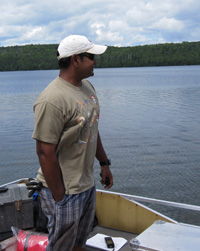 The National Science Foundation has awarded a three year $439,041 grant to Dr. Puni Jeyasingh, in the Zoology Department at Oklahoma State University. His research focuses on whether predictions of evolutionary shifts in the physiology of animal populations can be based on historical changes in the environment. Answers to such questions should foster better forecasting models of global environmental change and inform effective management. Using a unique model organism, Daphnia, a small crustacean that lives in lakes and produces resting eggs that can lay dormant in sediments for centuries, the scientists, which include Drs. Larry Weider at the University of Oklahoma, and Mark Edlund at the Science Museum of Minnesota, have been able to directly observe the consequences of man-made change in a natural population. The investigators will study the precise mechanisms that underlie observed evolutionary shifts coinciding with changes in key environmental parameters such as phosphorus (P) loading history (nutrient enrichment that affects water quality). Specifically, they will use cutting-edge paleolimnological tools to examine lake-bottom sediments to reconstruct environments reflective of pre- and post-European settlement in a Minnesota lake, and use that information to test the performance of ancient and extant Daphnia genotypes to assess anthropogenic impacts. Furthermore, they will identify the genes that underlie such evolutionary shifts. The performance of these genes in predicting responses to nutrient enrichment (eutrophication) in a different lake will also be assessed.
The National Science Foundation has awarded a three year $439,041 grant to Dr. Puni Jeyasingh, in the Zoology Department at Oklahoma State University. His research focuses on whether predictions of evolutionary shifts in the physiology of animal populations can be based on historical changes in the environment. Answers to such questions should foster better forecasting models of global environmental change and inform effective management. Using a unique model organism, Daphnia, a small crustacean that lives in lakes and produces resting eggs that can lay dormant in sediments for centuries, the scientists, which include Drs. Larry Weider at the University of Oklahoma, and Mark Edlund at the Science Museum of Minnesota, have been able to directly observe the consequences of man-made change in a natural population. The investigators will study the precise mechanisms that underlie observed evolutionary shifts coinciding with changes in key environmental parameters such as phosphorus (P) loading history (nutrient enrichment that affects water quality). Specifically, they will use cutting-edge paleolimnological tools to examine lake-bottom sediments to reconstruct environments reflective of pre- and post-European settlement in a Minnesota lake, and use that information to test the performance of ancient and extant Daphnia genotypes to assess anthropogenic impacts. Furthermore, they will identify the genes that underlie such evolutionary shifts. The performance of these genes in predicting responses to nutrient enrichment (eutrophication) in a different lake will also be assessed.
